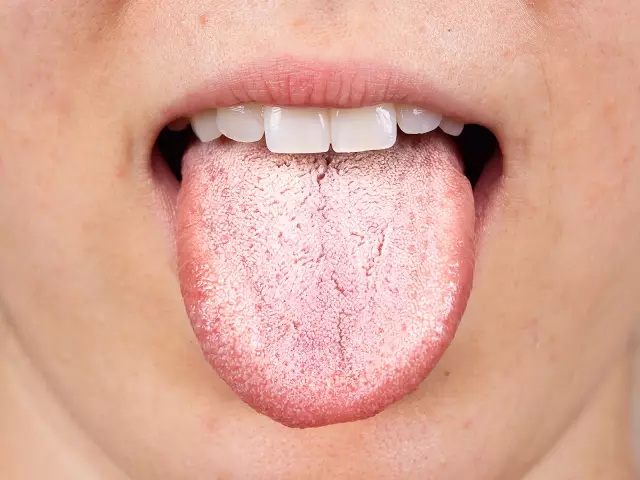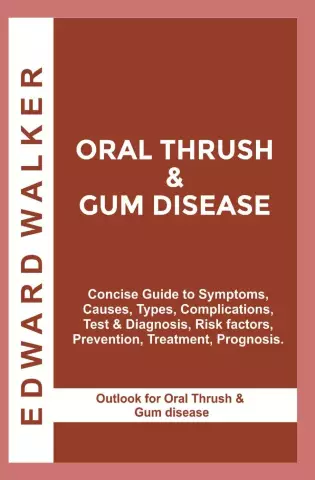- Author Rachel Wainwright wainwright@abchealthonline.com.
- Public 2023-12-15 07:39.
- Last modified 2025-11-02 20:14.
Thrush in nursing
Thrush in nursing mothers is considered the most common infectious process. The mucous membrane of the external genital organs is most often affected.

Yeast fungi of the genus Candida cause thrush. These microorganisms are found in almost every healthy person. For the first time, they get on the skin and mucous membranes of the baby during birth. Passing through the birth canal, the baby becomes infected with the mother's microflora, including Candida. Further, a person lives quietly with such a flora, without any signs of illness. Fungi can be found in the mouth, intestines, skin, and genitalia.
Under certain conditions, the number of microorganisms increases sharply. Then the disease develops thrush (candidiasis). Thrush in nursing mothers is associated with a drop in immunity, hormonal imbalance, and vaginal and intestinal dysbiosis.
Thrush during breastfeeding is partly due to increased prolactin and the absence of ovulatory menstrual cycles. Although this condition is certainly absolutely physiological for the female body, nevertheless, it contributes to the development of candidiasis. A decrease in the functional activity of the immune system is associated with a previous pregnancy and childbirth. The female body needs vitamins, minerals and just time to recover. Due to the depletion of the protective forces, thrush during feeding appears in every third woman.
Is it necessary to treat thrush in nursing mothers?
Sometimes women do not have enough time for themselves in the postpartum period and all the time of lactation. However, you should not neglect the treatment of thrush in nursing. Discomfort during urination, pain, burning sensation reduce the emotional background of a woman, contribute to the refusal of sexual relations, the development of depression.
The consequences of thrush during breastfeeding lie not only in the field of psychology and family relations. The inflamed mucous membrane becomes especially vulnerable to other infections. Sometimes nonspecific inflammation of the external genital organs and urinary tract develops. Especially dangerous is an infectious lesion of the bladder and kidneys.
Thrush when feeding a baby is potentially dangerous for a baby. Dysbacteriosis in the mother contributes to the development of a similar pathology in the baby. Candidiasis in newborns and children of the first year of life is associated with thrush in nursing mothers. Oral candidiasis in a child can lead to food refusal. In severe cases, thrush in children is treated in a hospital setting. Self-medication in women with thrush during feeding is extremely dangerous for the baby. Many medications can harm the baby's health through breast milk.
Complaints of women with thrush while breastfeeding
Most often, thrush during breastfeeding occurs in those who have encountered a similar problem before. The manifestations of thrush in nursing mothers are the same as in other women. The inflammation occurs on the mucous membrane of the external genital organs. Many are concerned about severe constant itching and burning. Discomfort increases with urination and during intercourse. A very characteristic manifestation of candidiasis is considered to be abundant vaginal discharge in the form of white cheesy flakes.
All these complaints should be a reason to seek medical help. Sometimes the manifestations of thrush in nursing are almost invisible. In this case, it is especially important to be examined by a doctor at the slightest discomfort. When visiting your gynecologist on a routine basis, report all your complaints.
Confirming the diagnosis of thrush during feeding
A gynecologist at an antenatal clinic or at any other medical center will most likely prescribe an additional examination if you suspect thrush in nursing mothers.
It is considered sufficient to take a smear for analysis from the vaginal mucosa. The resulting material contains various microorganisms. They are placed on special laboratory dishes with a nutrient medium. Further, microorganisms are grown in favorable conditions during the day. After that, the laboratory assistant evaluates the resulting colonies of bacteria and fungi. Among them, there may be colonies of the Candida fungus. If there are many such colonies, and the normal flora of the vagina is practically absent, then a diagnosis of thrush is established in a nursing woman. Next, the sensitivity of microorganisms to various antifungal drugs is determined. Knowing the drugs that are effective in this case, the gynecologist will be able to choose the most suitable treatment regimen.
How to treat thrush while breastfeeding?
The arsenal of antifungal drugs is wide, but not all of them can be used by a nursing mother. Some medications can harm the baby. Oral capsules and tablets are especially effective. Their active ingredients first enter the mother's bloodstream and then into breast milk. Eating such milk, the child also receives a certain dose of the drug.
Creams, candles, douching act mainly only locally. They hardly penetrate into blood and breast milk. But with local remedies, care should be taken during the treatment of thrush in nursing.
You can independently undergo a course of treatment with an infusion of medicinal herbs in the form of douching twice a day. Chamomile, calendula, and oak bark are the best help for thrush during breastfeeding. A solution of baking soda (1 spoon per liter of water) will help relieve itching and burning. If all this turns out to be ineffective, be sure to consult a doctor.

The most popular remedies for thrush during lactation are prohibited. Flucostat, Diflucan, Mikosist, Clotrimazole will have to be excluded from the treatment regimen. In the form of tablets, only the modern antifungal drug Pimafucin is considered safe. Most often, gynecologists recommend local treatment with suppositories and vaginal pills. For the treatment of thrush in nursing mothers, Pimafucin, Livarol, Terzhinan, Hexicon, Iodoxide and Betadine are used. These medicines are effective and safe for breastfeeding.
How to prevent thrush in nursing mothers
Ideally, prevention of thrush in nursing mothers begins before conception. A woman should be examined by a gynecologist. When latent thrush or vaginal dysbiosis is detected, women planning pregnancy are prescribed a course of antifungal drugs. In this contingent of patients, both immunomodulators and preparations of the normal bacterial flora can be used.
Proper nutrition also helps prevent thrush during breastfeeding. It is necessary to give up overeating and excessive consumption of carbohydrates, especially sugar. Eat more vegetables, especially those rich in fiber and micronutrients. Lingonberry leaves and berries, garlic, red pepper may be useful. To normalize the intestinal and vaginal microflora, eat fermented milk products daily.
Correctly selected complex preparations of vitamins and trace elements can be useful for the treatment and prevention of thrush in nursing mothers.
YouTube video related to the article:
Found a mistake in the text? Select it and press Ctrl + Enter.






